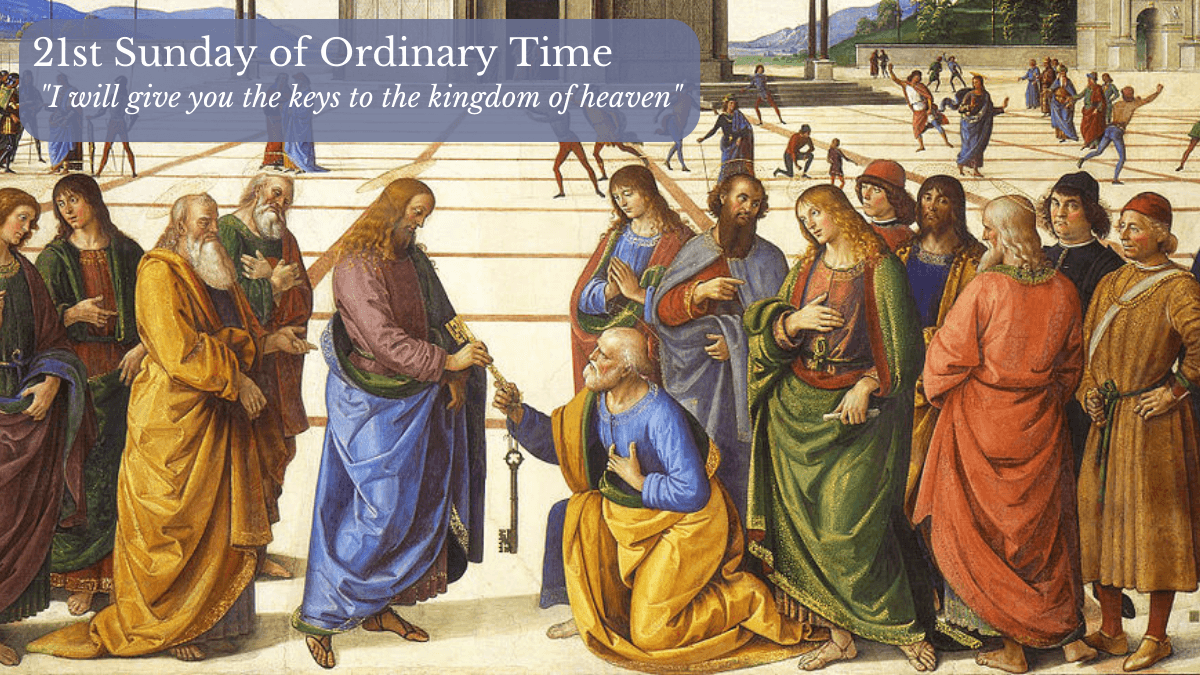On the Back Porch

21st Sunday of Ordinary Time, Year A

What We Celebrate
Peter’s confession of Jesus as the Messiah forms the climax to the long section of the Gospel which began in 4:17 with Jesus’ public teaching in Galilee. A lot of that narrative is devoted to three essential questions: (a) who is Jesus, (b) what does it mean to be his disciples in the light of his identity, and (c) what choices will you make because of his call. In previous two Sunday gospels we have seen these questions addressed in the story of Peter walking upon the waters (Mt 14:22-33) and the encounter with the Canaanite woman (15:21-28). These stories serve as the immediate context for our gospel about Peter’s confession and what it will mean for him in his on-going role of discipleship. It is a rich and robust gospel. Come and take a moment on the back porch!
Full Text of the Sunday Readings
Detailed Commentary on the Gospel
Image credit: Pietro Preugino, The Delivery of the Keys (c 1481–1482). Sistine Chapel, Vatican City | Public Domain
The Prophet Isaiah
Lately the first readings have been from the prophet Isaiah. Here are two animated videos that give a great overview of Isaiah. But consider a passage from the readings for the 20th Sunday:
“The foreigners who join themselves to the LORD, ministering to him, loving the name of the LORD, and becoming his servants—all who keep the sabbath free from profanation and hold to my covenant, them I will bring to my holy mountain.” (Is 56: 6-7)
Why do you think the Church has paired this reading from Isaiah with the Gospel of Matthew’s account of Jesus and the Canaanite Woman? Although Isaiah’s primary audience was the nation of Judah, some of his prophecies had broader implications. For instance, Isaiah 2:2-4 speaks of all nations streaming to God’s mountain to learn His ways and walk in His paths, indicating a universal message of peace and harmony among all people.
Explore this and other messages from the Prophet Isaiah in the two videos!
The careful reader of Matthew should be mindful that there have been persistent hints. From the beginning of the Gospel, Matthew begins to make it clear that the community of the Messiah is formed from unexpected sources. The mention of Tamar, Rahab, Ruth, and Bathsheba in the genealogy, all evidently Gentiles with overtones of scandal in their backgrounds, prepares the reader for Jesus’ association with the sinners of his own day. The curious arrival of the mysterious wise men (Magi) from the east who wish to worship Jesus foreshadows the power of the message of the Kingdom to summon followers in surprising ways. Jesus’ amazement at the faith of the Roman officer and his acknowledgement of the faith of the Canaanite woman encourage the readers of this Gospel to believe that the message of the Kingdom is able to engender faith from unlikely sources in their own day. All of these episodes from the narrative collectively encouraged Matthew’s original Jewish readers to expand their vision of the people of God. It was not that they should abandon their fellow Jews, but they were to take the message of the Kingdom to all the nations – fulfilling their mission and the vision of Isaiah.